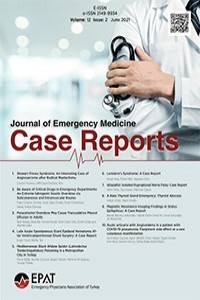Travma Öyküsü Yoksa Ne Oldu?
Sarsılmış bebek sendromu, kafa, travma, subdural hematom
If There Is No Trauma History, What’s Happened?
Shaken baby syndrome, head, trauma, subdural hematoma,
___
- Balcı E, Gün I, Mutlu Şarlı Ş, Akpınar F, Yağmur F, Öztürk A, Günay O. Still an unknown topic: child abuse and "shaken baby syndrome". Ulus Travma Acil Cerrahi Derg. 2011; 17: 430-4. [CrossRef]
- Piteau SJ, Ward MG, Barrowman NJ, Plint AC. Clinical and radiographic characteristics associated with abusive and nonabusive head trauma: a systematic review. Pediatrics. 2012; 130: 315-23. [CrossRef]
- Laurent-Vannier A, Toure H, Vieux E, Brugel DG, Chevignard M. Long- term outcome of the shaken baby syndrome and medicolegal consequences: a case report. Ann Phys Rehabil Med. 2009; 52: 436-47. [CrossRef]
- Yağmur F, Asil H, Per H, Coşkun A, Aslan D. Sarsılmış Bebek Sendromu & 3 Olgu Sunumu. Adli Tıp Derg 2010; 24: 42-9.
- Yağmur F, Asil H, Canpolat M, Per H, Coşkun A. Kısa Mesafeli Düşme ve Sarsılmış Bebek Sendromu. Türkiye Klinikleri J Med Sci 2010; 30: 766-71. [CrossRef]
- Karbeyaz K, Şahin S, Akkaya H, Balcı Y, Gündüz T. Sarsılmış Bebek Sendromu (Shaken Baby) Sonucu Ölüm; Olgu Sunumu. Adli Tıp Derg. 2012; 26: 134-40. [CrossRef]
- Yalçın SS. Abusive head trauma: the place in scientific papers. Çocuk Sağlığı ve Hastalıkları Dergisi 2011; 54: 227-30.
- Anderst JD. Assessment of factors resulting in abuse evaluations in young children with minor head trauma. Child Abuse Negl. 2008; 32: 405-13. [CrossRef]
- Morad Y, Kim YM, Mian M, Huyer D, Capra L, Levin AV. Nonophthalmologist accuracy in diagnosing retinal hemorrhages in the shaken baby syndrome. J Pediatr. 2003; 142: 431-4. [CrossRef]
- Barr RG, Trent RB, Cross J, Age-related incidence curve of hospitalized Shaken Baby Syndrome cases: Convergent evidence for crying as a trigger to shaking. Child Abuse & Neglect 2006; 30: 7-16. [CrossRef]
- Yayın Aralığı: 4
- Başlangıç: 2010
- Yayıncı: Alpay Azap
İlginç Bir Metanol Zehirlenmesi: Vaka Sunumu
Ramazan KÖYLÜ, Emine AKINCI, Öznur KÖYLÜ, Zerrin Defne DÜNDAR, Yahya Kemal GÜNAYDIN, Nazire Belgin AKILLI, Yaşar SAKARYA, Başar CANDER
Arrest Hidrosefalide Artmış İntrakraniyel Basıncın Optik Sinir Ultrasonografisi ile Doğrulanması
Vaner KÖKSAL, Özcan YAVAŞİ, Kamil KAYAYURT, Özlem BİLİR, Erhan UĞRAŞ
Allopürinole Bağlı Gelişen Nadir Bir Durum: DRESS Sendromu
Esra KARAMAN, Muhammet Gokhan TURTAY, Sukru GURBUZ, Hakan OGUZTURK, M. Ediz SARİHAN, Serkan BİCAN
